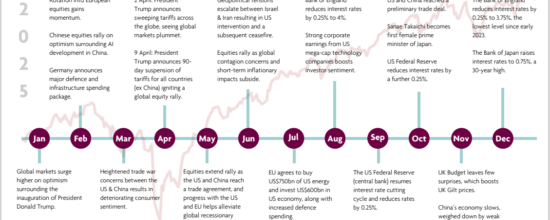UK stocks rally as economy exits recession
To download the market update click here: PDF | Word
The FTSE 100 soared to a record high while the British economy expanded by more than expected
After rallying to a record high earlier in the month, the FTSE 100 dipped after higher-than-expected inflation pushed back market expectations for the Bank of England’s first interest rate cut. Although inflation dropped to 2.3% in April, economists had predicted it would drop to 2.1%. The Bank held interest rates at a 16-year high of 5.25% but suggested that cuts are imminent.
Prime Minister Rishi Sunak announced a snap general election, but while there may be some short-term uncertainty, it is unlikely to have a significant impact on financial markets. In a boost for the government, the UK exited recession with the fastest growth in two years of 0.6% in the first quarter of 2024.
Annual growth in average weekly wages, including bonuses, rose by 5.7% in the three months to March. However, there are signs the labour market is cooling, with the rate of unemployment increasing to 4.3% from 4.2% in the previous three months.
US inflation cools
Markets were lifted after US inflation cooled in April following three consecutive elevated readings, providing some relief for consumers. The consumer price index (CPI) rose at an annual rate of 3.4% in April, down from 3.5% the previous month.
The US Federal Reserve (Fed) held interest rates steady at 5.25% to 5.5% – the highest level since 2007. Fed Chair Jerome Powell said inflation is still too high and rate cuts would not happen until he has greater confidence that price growth is falling towards the 2% target.
US job growth cooled and unemployment ticked up in a sign that the economy could be slowing. Employers added 175,000 positions in April, while the unemployment rate rose from 3.8% in March to 3.9%.
Euro stocks hit new highs
European stocks hit fresh highs after the euro area emerged from recession in the first three months of the year. The region’s GDP rose by 0.3% in the first quarter of the year compared with the previous three months, after declining by 0.1% in the final two quarters of 2023. Employment increased by 0.3% in the first quarter, while industrial production in March was marginally better than expected.
Inflation figures have boosted hopes of interest rate cuts by the European Central Bank (ECB). The annual rate of price growth remained steady at 2.4% in April, only slightly above the ECB’s 2% target. Core inflation, which excludes volatile food and energy prices, fell from 2.9% to 2.7% – the lowest since the start of the Ukrainian War.
Meanwhile, US President Joe Biden ratcheted up the trade war with China by slapping major new tariffs on Chinese electric vehicles, advanced batteries, solar cells and other goods. China has also rolled out new measures to help boost its ailing property sector after new figures showed housing prices have dropped nearly 10% since the start of the year. These include encouraging local governments to buy real estate and relaxing mortgage rules. In a boost for the world’s second largest economy, exports rose slightly more than expected in April by 1.5% in dollar terms from a year earlier.



